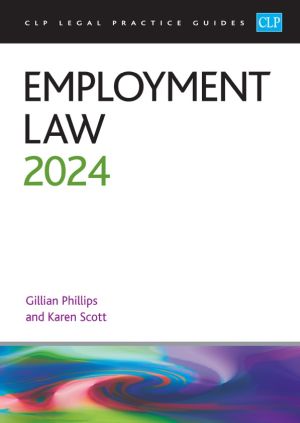
Legal Practice Guides:
Unrivalled for clarity, authority and cost effectiveness, the CLP Legal Practice Guides explain in detail the principles of each area of legal practice. Each title is complemented by worked examples, checklists, model forms and relevant legislation.
Published annually, these user-friendly guides are ideal points of reference for students studying the Legal Practice Course and for practitioners, whether newly qualified or as a means of keeping up with the latest developments.
Employment Law:
Employment Law introduces the issues involved in the regulation of employees and their relations with their employers. It explains the framework governing employment contracts, dismissal procedures and redundancy payments. The book also covers TUPE, discrimination law and family-friendly legislation, as well as practice and procedure. The book has been comprehensively updated to take account of all the main recent and proposed developments in employment law and practice. It also takes account of the continuing impact of Brexit and the EU Withdrawal Act in the employment law sphere.
The seminal Supreme Court judgment in Chief Constable of the Police Service of Northern Ireland v Agnew on the relevant time limits for the recovery of holiday pay and unlawful deductions from wages is included, along with a number of important Court of Appeal decisions, including the decisions in Phipps v Priory Education Services Ltd (on reconsideration of judgments by the employment tribunal), Sainsbury’s Supermarkets v Clark (looking at Rule 10 of the Employment Tribunal Rules, multiple claims and Early Conciliation certificates), Clifford v Millicom Services UK Ltd (on the scope of Rule 50 and open justice) and Arvunescu v Quick Release Ltd (on the wording of COT3 agreements).
The case law has been updated to take account of a number of significant EAT decisions including, for example, cases on the calculation of pay for accrued but untaken statutory holiday (Connor v Chief Constable of the South Yorkshire Police) and discrimination (Pipe v Coventry University Higher Education Corporation –the correct approach to determining age and disability discrimination; Alcedo Orange Ltd v Ferridge-Gunn – discriminatory dismissals and pregnancy; The Royal Parks Ltd v Boohene – indirect race discrimination; and Higgs v Farmor’s School – direct discrimination and harassment related to religion or belief). The EAT decision in Greasley-Adams v Royal Mail Group Ltd on harassment under the Equality Act 2010 is also considered, along with a number of EAT decisions on procedural matters, such as the impact of ‘without prejudice’ communications (Meaker v Cyxtera Technology UK Ltd and Garrod v Riverstone Management Ltd), when cases can be struck out (Smith v Tesco Stores and Kaul v Ministry of Justice), unless orders (Mohammed v Guy’s & St Thomas’ NHS Foundation Trust and Minnoch v Interserve FM Ltd), when it is appropriate to stay a case (Lycatel Services Ltd v Schneider) and litigants in person and lists of issues (Moustache v Chelsea and Westminster NHS Foundation Trust).
The cases of TYU v ILA Spa Ltd (where the EAT conducted a comprehensive review of the legal authorities around Article 8 ECHR privacy rights in an open justice context) and Frewer v Google UK Ltd (on the balancing of Articles 8 and 10 ECHR) are also included.
The book is up to date as at 1 October 2023, although account has been taken of some later developments as at 11 November 2023.